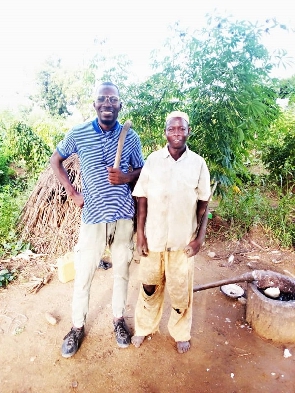 The regional chairman of the peasant farmers association of Ghana, Salifu Amadu (left)
The regional chairman of the peasant farmers association of Ghana, Salifu Amadu (left)
In Ghana, Cassava is mostly grown in the forest agroecological zones consisting of Eastern, Brong-Ahafo, Ashanti, Central, and Volta regions, contributing about 86% of the total national production.
Meanwhile, cassava production in the Upper West Region is a highly minimal contribution to the neglect of the staple crop by stakeholders in the region.
Some cassava farmers in Gudaayiri a farming community in the Wa East District of
the Upper West Region have lamented the continued intrusion of their farm by
cattle coupled with the lack of a ready market.
Iddrisu Mujeebu a cassava farmer said the Fulani herdsmen deliberately allow
their cattle to grace their farms, indicating that the Fulani herdsmen practice the misdeed at night compelling them to keep watch at night in their farms.
According to the young farmer, in some instances, the herdsmen attempted to
attack one of the farmers at night until he surfaced and the herdsman gave up.
He added that two of them have recorded sneak bites on two occasions during
midnight surveillance on their respective farms.
Furthermore, Mujeebu revealed that due to their few numbers in root and tuber
crop farming, they are unable to push for by-laws to be enacted by the traditional authority to permanently address the cattle menace.
On his part, Zuberu Mumuni said that root crop farming is all year round, and
during this time, he has to weed his farm about four times to get a good yield.
This he said is due to the high cost of farm inputs/chemicals, adding that
depending on the variety of cassava, it can be harvested between 6 to 24 months.
Zuberu further cited post-harvest losses from harvesting through to storage as
one of the topmost challenges confronting cassava farmers in the area due to the
lack of appropriate farm tools.
The Upper West Regional Chairman of the Peasant Farmers Association of Ghana
Salifu Amadu said most cassava farmers in the region do not do it on a
commercial basis but on a subsistence basis, hence contributing to the lack of
ready market for the root and tuber crop.
"Cassava under optimal conditions, can reach a yield of 80 tonnes per hectare (32.4 tons per acre). Nowadays, the current world average yield is around 12.8 tonnes to reach 23.3 tonnes per hectare soon while its global market size was valued at USD 40.53 billion in 2018 and is projected to reach USD 66.84
billion by 2026", he said.